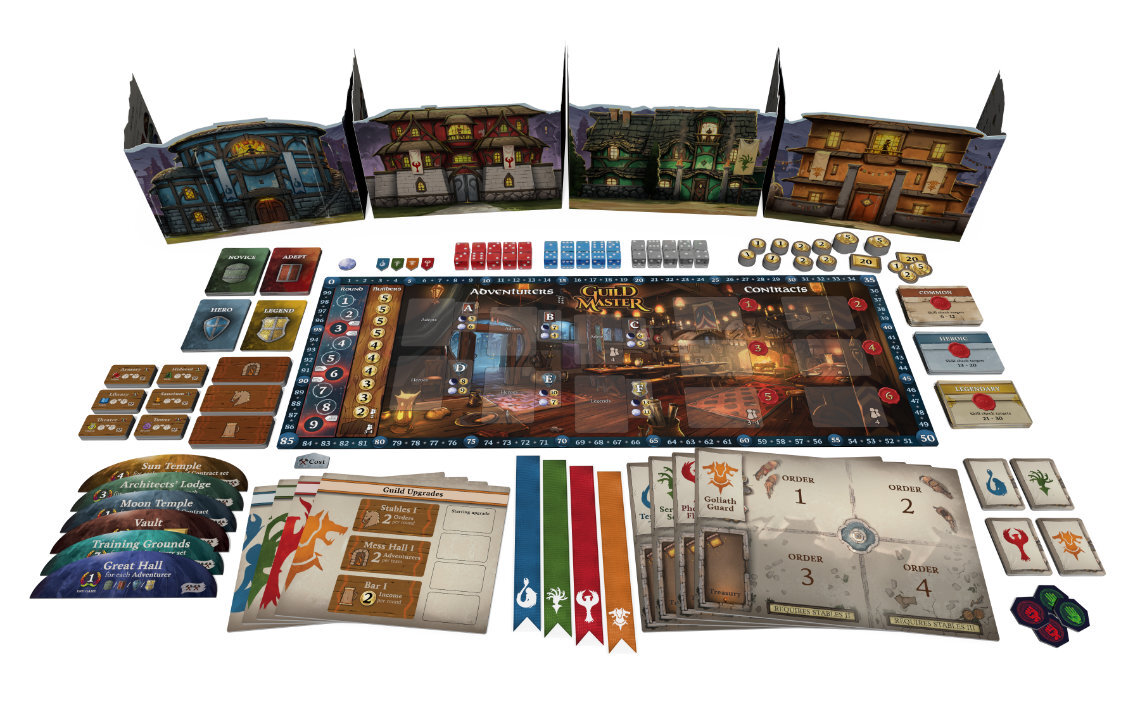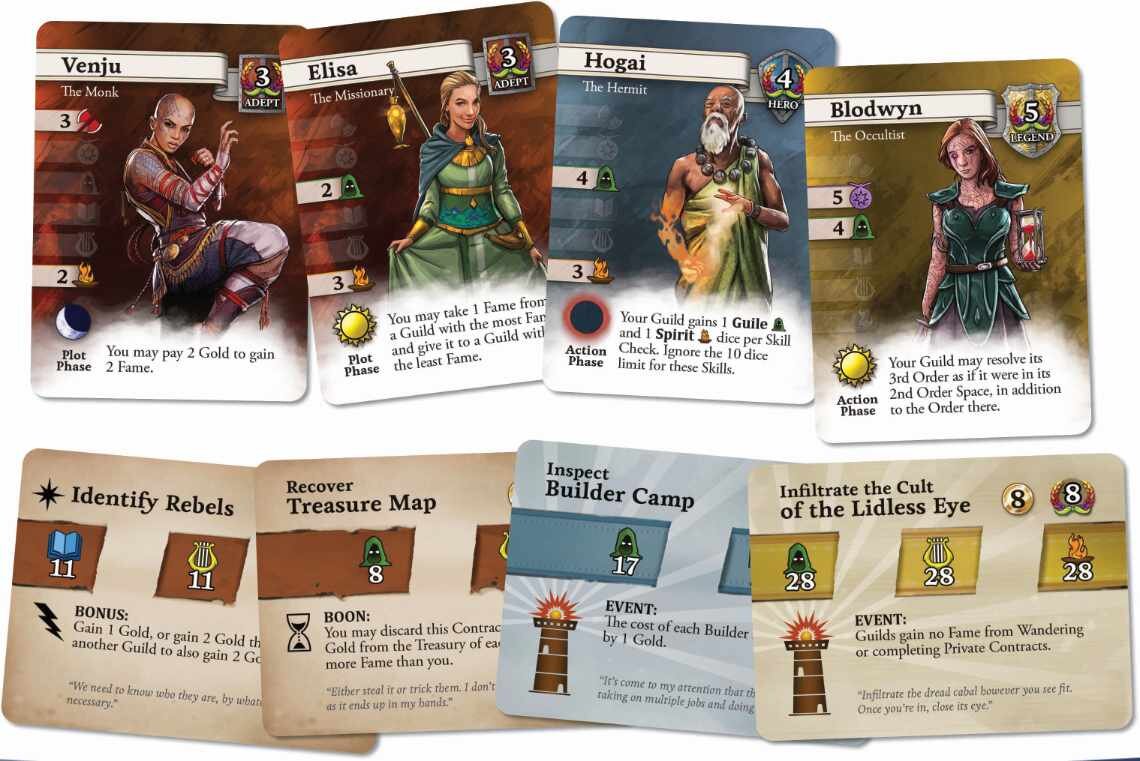Guild Master – First Impressions
Review copy provided by the publisher
Cue the voiceover magic of someone like Redd Pepper or the likes…
In a world where trouble is brewing, the only guilds with a good soup ladle are sitting around the table. You’re the master of your own establishment, but it could use an upgrade or two and some new blood to fill out the ranks of eager adventurers.
Contracts abound and only the most hungry adventurers will be able to show off their skills and hound down the gold and fame that comes with it.
Start off as a small guild and end as master of the best in the business. It’s up to you…
Guild Master is a game for 2-4 players from designer Chris Antony and Good Games Publishing. It’s a social strategy and negotiation card game with variable player powers. Players will control their own guilds and work to build fame by upgrading their establishment, hiring the right adventurers, and completing contracts that have been posted. But they’ll be competing against other guilds and will need to be savvy in how they go about their business.
Be a risk-taker but also a smooth talker. That’s how you’ll get ahead.
What It Does
Guild Master feels somewhere in between Lords of Waterdeep and A Game of Thrones: The Board Game. Like the classic worker placement game, it involves getting Adventurers to complete Contracts (similar to Quests), but instead of resource cubes, Adventurer cards reveal their Skill strengths—Might, Spirit, Guile, Charm, Arcane, and Logic.
Instead of worker-placement mechanics, though, players engage in a hidden order selection process, similar to the facedown order tokens in A Game of Thrones before revealing and resolving the order in which players activate certain spots on the board. Much like in the Westeros strategy game, players might encounter a scenario in which they’ve been beaten to the punch and their choice is no longer a viable option.
Players need to studiously manage their guild, recruiting the right adventurers to diversify the overall skill set the guild can accommodate while also upgrading the right functions and pursuing the right contracts. Over the course of nine rounds, players will continue their simultaneous programming in the hopes that they send the best adventurers at the most opportune times.
Contracts will get more difficult. Adventurers will offer more perks. Upgrades will be crucial to maintain momentum. And the order in which players decide to do it all will be key to success.
How It Does It
Players will examine the board each turn, looking at possibilities with building upgrades, hiring new adventurers, and fulfilling open contracts.
After a period of deliberation, players will secretly place orders on groups of adventurers to send them to one of the three areas on the board.
Then, after players unmask their hidden selections, order resolution will occur in order from building to hiring to fulfilling. Any contested spots will be resolved by figuring out the highest bidder or through players determining whether to work together or battle it out and see who’s the most skillful.
Fame and money are distributed whenever they’re earned.
And players go through nine rounds of that until the game ends and someone is declared the winner.
So, it’s got hidden order selection, bidding, dice-rolling skill checks, player upgrades, and social negotiation, all set around a victory track based on Fame and a tight economy system using coins. There are bonuses and events tied to the contracts that players try to complete, but those will be on an individual basis.
On the surface, there seems to be a lot going on, but it’s actually quite smooth when a round commences and players will be able to push through the game with few hiccups along the way. Further aiding the players’ understanding of the game is a Quick Start Guide that will carry players through the entire first round of a game if everyone at the table prefers to learn by doing.
Chris Antony has created a fun and engaging amalgam of board game mechanisms and they mix together for a clever cocktail of social and strategic satisfaction.
Why You Might Like It
Any hidden order-selection system is bound to create tension and anxiety, along with the thrill of surprise when players reveal what they’ve picked. Guild Master achieves that, as well as an additional layer of social negotiation as player navigate the resolution of the round.
Guild upgrades through building, adventurer recruiting through bidding, and contract fulfillment through skill checks. There is quite a bit of strategic consideration every turn and the decisions of other players compound the risk and reward system that Chris Antony has introduced.
Why You Might Not
With any game that relies on player interaction and negotiation, higher player counts typically result in the best experience. While Guild Master still plays well at two, it’s certainly going to be a more engaging gameplay session with three or four players as there is more competition for the spaces on the board.
It’s got quite the table presence and it takes up a lot of real estate. The main board, the upgrades, and the player boards all need to cram close together so players can see what everyone else is doing so the visual clutter might be a lot for some players.
Final Thoughts
Photo credits: Good Games Publishing
Guild Master embodies some of the strategic trickery of games like A Game of Thrones and Forbidden Stars, but it doesn’t carry the same feeling of despair when a player’s move is taken away because there are conciliatory actions that can be taken. A turn is never fully lost. It’s just diluted. Additionally, when a turn is not taken but rather contested, there are two avenues to go down. Players can opt to cooperate and better ensure they gain something from a turn. But they can also go down the route of competition and try to box their opponent out of a contract.
The game gives players the freedom to decide how they resolve conflict and then it usually gives players an opportunity to resolve a lesser action when their intentions are subverted before it’s their turn. Only when a player engages in a contested order with another player and loses do they truly not get something out of a turn.
When design enables players to explore strategic nuance but doesn’t overly punish them, it creates an engaging experience that is welcoming for a wider array of players.
Now don’t get me wrong. I love the vicious potential of A Game of Thrones, Forbidden Stars, and other tabletop strategy games like them. It’s exhilarating when you’re able to pull off a tactical coup and savage another player’s planning.
But it’s not going to have a wider appeal of games like Guild Master, which could potentially bring more people to the table. And most commonly the point of playing games (for me at least) is to play with other people and I want them to have the most opportunities to play and to win.
I do think that Guild Master is susceptible to player count imbalance, though. It’s not severe like with larger social and party games that crumble into bad experiences with few players, but I think that the experience will be staggered—with the best time at four players, a great time at three players, and a good time with two players. Two players (the player count I’ve tried so far) will enjoy the strategic structure of what Guild Master aspires to be, but they likely won’t experience the full-bodied dose of social negotiation and interplay that comes with more people at the table.
BoardGameGeek community members suggest four players for the best time, and I believe that will be the case as well.
However, if we’re looking past player counts and the social element of the game, Guild Master is also just a fun time. It’s a tight game of economic growth with regards to building upgrades. In the nine rounds of the game, players might be unsure if they’ll be able to build that momentum necessary to get larger groups of adventurers and more Fame. It’s well-tuned, however. By the end of the game, I was able to complete what I wanted to with the right number of adventurers. It felt satisfying.
So I definitely want to see how the game will grow on the table with one or two more people to play off of!
If you want to check out Guild Master, you can visit Good Games Publishing or read what the community thinks on BoardGameGeek.
Simultaneous order selection? In secret?! This is one of those social bargaining games that is definitely best at higher player counts. Does Guild Master interest you?
Let us know in the comments and give a recommendation for other games of which to share our first impressions.





